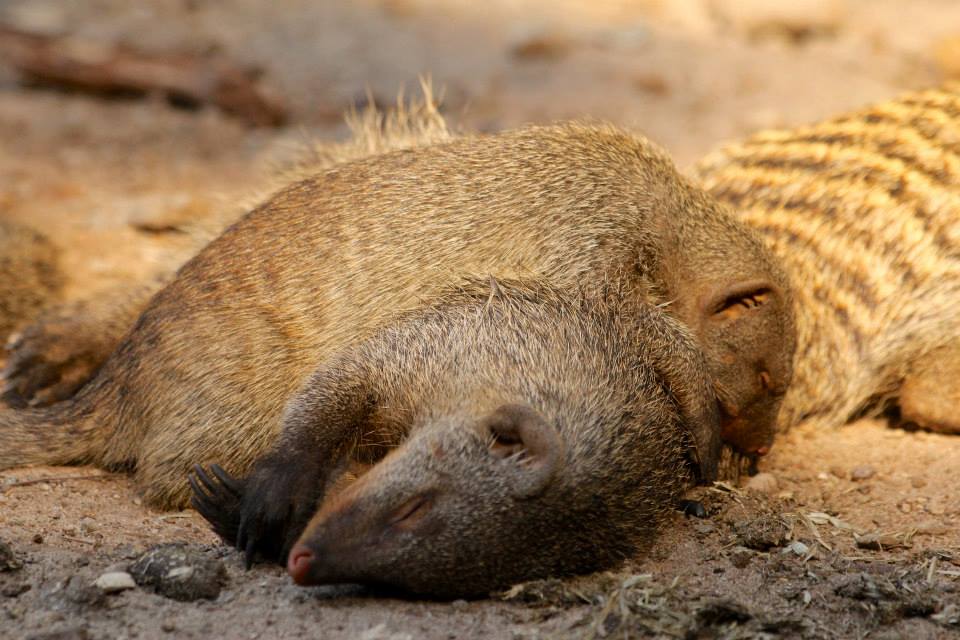African Wildlife May Be Acquiring Antibiotic Resistant Bacteria From Nearby Humans | Smart News | Smithsonian
Our research indicates that antibiotic resistance is a growing problem even in remote regions of the world. This work was done as part of an NSF CNH funded project.
This builds on our earlier work investigating the movement of microorganisms between mongoose and humans. Data suggest it is common - as was antibiotic resistance.
Pesapane, Ponder, Alexander - 2013
Tracking pathogen transmission at the human-wildlife interface: banded mongoose and Escherichia coli. - Ecohealth
http://www.ncbi.nlm.nih.gov/pubmed/23612855
Banded mongoose

Two mongoose take an afternoon nap. This highly social species is threatened by a novel tuberculosis pathogen.
Monday 31 August 2015
Thursday 27 August 2015

 Education is the cornerstone of progress and an important partner to research. Students from two local primary schools participate once a week in an after school club where a specially developed health and science curriculum is being delivered. Developing passion and interest in the environment is a critical first step to improved stewardship. Equally important, is the development of an interest in science and health so tomorrow's scientists and leaders are able to manage our increasingly complex world.
Education is the cornerstone of progress and an important partner to research. Students from two local primary schools participate once a week in an after school club where a specially developed health and science curriculum is being delivered. Developing passion and interest in the environment is a critical first step to improved stewardship. Equally important, is the development of an interest in science and health so tomorrow's scientists and leaders are able to manage our increasingly complex world.Friday 21 August 2015
check this out!
The Impact of Health Status on Dispersal Behavior in Banded Mongooses (Mungos mungo) - Springer
Our research identifies important links between behavior and infectious disease dynamics.
Human Disease Leptospirosis Identified in New Species, the Banded Mongoose, in Africa | NSF - National Science Foundation
Our work on the banded mongoose has provided important insight into the community of pathogens that occur in this diverse ecosystem. We are working closely with the Ministry of Environment, Wildlife, and Tourism and the Ministry of Health in Botswana.
Our work on the banded mongoose has provided important insight into the community of pathogens that occur in this diverse ecosystem. We are working closely with the Ministry of Environment, Wildlife, and Tourism and the Ministry of Health in Botswana.
Welcome to our blog. We will be using this space to share our research program with you! This project is aimed at understanding how disease and other threats impact social species. We are studying the banded mongoose - this species is social and occurs across protected and unprotected landscapes - allowing us to ask important questions including how we affect social species and their continued survival.
Banded mongoose are small (<2 kg) group-living, territorial carnivores. They occur in groups or troops that can number 8-65 individuals in our study area. This species has been the focus of a long-term study in Chobe, Botswana since 2000 where we have developed a field research laboratory and work collaboratively with the Ministry of Environment, Wildlife, and Tourism. Banded mongoose are infected with Mycobacterium mungi, a novel emerging M. tuberculosis complex pathogen that appears to be directly transmitted through a non-respiratory route. Endemic disease in this system allows us to investigate our study questions, identify theory and knowledge, as well as dynamical modeling approaches that have broad application across a larger class of systems where group-living may make some species more vulnerable to disease and other sources of mortality.
Banded mongoose are small (<2 kg) group-living, territorial carnivores. They occur in groups or troops that can number 8-65 individuals in our study area. This species has been the focus of a long-term study in Chobe, Botswana since 2000 where we have developed a field research laboratory and work collaboratively with the Ministry of Environment, Wildlife, and Tourism. Banded mongoose are infected with Mycobacterium mungi, a novel emerging M. tuberculosis complex pathogen that appears to be directly transmitted through a non-respiratory route. Endemic disease in this system allows us to investigate our study questions, identify theory and knowledge, as well as dynamical modeling approaches that have broad application across a larger class of systems where group-living may make some species more vulnerable to disease and other sources of mortality.
Subscribe to:
Posts (Atom)





